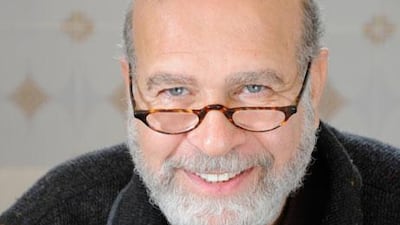As only the second recipient of the biennial Jameel Prize at London's Victoria and Albert Museum (V&A), the Algerian artist Rachid Koraichi took away an award of £25,000 (Dh146,000) and acknowledgement of his Islamic craft from one of the world's leading cultural institutions on Monday evening.
The winning work is a collection of six tall banners that incorporate mystic symbols and plaits of calligraphy from Koraichi's hand. Each is dedicated to a Sufi master, the poet Rumi, for instance, or the 13th-century philosopher Ibn Arabi, and feature stick-figure whirling dervishes and imagery drawn from a well of esoteric sources.
Koraichi, who is in his 60s was selected from a shortlist of 10 artists that spans several generations. He was up against the likes of Monir Farmanfarmaian, a leading figure in Iranian modernism who has created beguiling mirror mosaics for the past 50 years. There was also much younger talent - Noor Ali Chagani, for instance, a trained Pakistani miniature painter who has applied his style to sculpting with tiny terracotta bricks.
But Koraichi's work fits perfectly into the Jameel Prize remit. His pieces draw on handmade traditions in the Islamic world. Speaking to The National just after receiving his award, Koraichi reflected on this inspiration, and found common ground with the other artists on the shortlist.
"The level of quality is stunning and I'm amazed to be with this group of people. Many of them merited this prize," he said. "I think that there are real connections going on between the minds of the artists here. Everyone is thinking about how we can join our present with our traditions."
Koraichi pointed to the shortlisted work of Bita Ghezelayagh, a series of felt shepherd's robes ornamented with iconography from the 1979 revolution in Iran. "I've had similar ideas myself, because I've wanted to talk about the importance of robes and costume in a living culture. I think that the big question shared by both the Islamic world and the West is of how you join modernity with your past."
What Koraichi tries to achieve in his work could be described as "living culture". There's almost a cumulative sense about these banners - the artist's extensive research into symbols, ritual and song become shards of inspiration that cling, magnet-like, to the visual composition. There's an ordering, but also some sense of free-association: the meaning of these nuanced symbols is never explained directly, yet they have some unnameable power that speaks to our intuition. Our understanding of them comes in glimpses. As a cave painting might communicate something in its most stripped-down form, so do these works tap into a shared symbolic understanding that is universal.
In that way, this works like reading the Sufi saints that Koraichi venerates. "We can talk about Ibn Arabi and Rumi, but I look at recent poets like Mahmoud Darwish and the work of John Berger. These are contemporary versions of the same overall intensity." Though we think we have modernised, nothing has really changed, Koraichi continued. "We breathe the same air, we look for the same fruitful relationships with people. These old poets speak to us today in exactly the same way as they did."
But a "living culture", Koraichi suggested, is best expressed with the hands. The imagery and composition on these six huge banners is so tight, yet the presence of the artist's hand gives them warmth. "When we talk about an Islamic craft tradition, we're not talking about the art of the 19th century that took place in an artist's studio and on canvas. Here we're talking about things that come out of everyday life," Koraichi said. "It's not a world in which the artist lives apart."
The culture of the artisan - still present, but steadily disappearing in the streets of Koraichi's native Algeria and surrounding Maghreb countries - offers an insight into how art can be drawn directly from a day-to-day world, yet heightened by the dedication of craft. "If you look at the foundations of western art," Koraichi continued, "it was based on a whole tradition of craft that went into churches; the goblets made by metalworkers and the marbling. It's exactly the same with mosques, in that they were built by those who could work with stone and weaving. These are sources that we can clearly see but the question we have is how to take those disappearing traditions and make them present again in the living moment."
Koraichi's works are offerings, first and foremost. To the Sufi saints they venerate, they offer the hand of an artist who has lived a life reading and reflecting on their lives. To the craftsmen that he adores - the streetside painters, metalworkers and, indeed, banner-makers of the past - he has carved out an oeuvre of offerings so that they not be forgotten. As Koraichi headed off to celebrate, he uttered a simple, telling koan: "All that is not offered, is lost."

